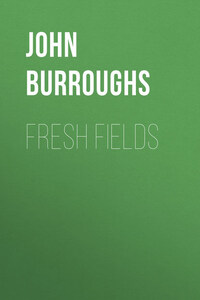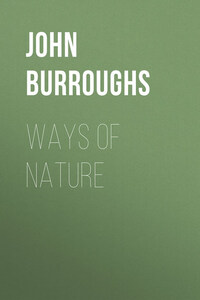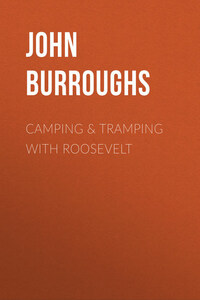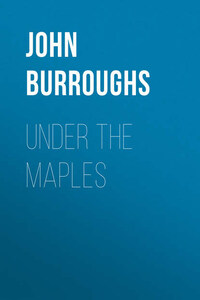The first whiff we got of transatlantic nature was the peaty breath of the peasant chimneys of Ireland while we were yet many miles at sea. What a homelike, fireside smell it was! it seemed to make something long forgotten stir within one. One recognizes it as a characteristic Old World odor, it savors so of the soil and of a ripe and mellow antiquity. I know no other fuel that yields so agreeable a perfume as peat. Unless the Irishman in one has dwindled to a very small fraction, he will be pretty sure to dilate his nostrils and feel some dim awakening of memory on catching the scent of this ancestral fuel. The fat, unctuous peat, – the pith and marrow of ages of vegetable growth, – how typical it is of much that lies there before us in the elder world; of the slow ripenings and accumulations, of extinct life and forms, decayed civilizations, of ten thousand growths and achievements of the hand and soul of man, now reduced to their last modicum of fertilizing mould!
With the breath of the chimney there came presently the chimney swallow, and dropped much fatigued upon the deck of the steamer. It was a still more welcome and suggestive token, – the bird of Virgil and of Theocritus, acquainted with every cottage roof and chimney in Europe, and with the ruined abbeys and castle walls. Except its lighter-colored breast, it seemed identical with our barn swallow; its little black cap appeared pulled down over its eyes in the same manner, and its glossy steel-blue coat, its forked tail, its infantile feet, and its cheerful twitter were the same. But its habits are different; for in Europe this swallow builds in chimneys, and the bird that answers to our chimney swallow, or swift, builds in crevices in barns and houses.
We did not suspect we had taken aboard our pilot in the little swallow, yet so it proved: this light navigator always hails from the port of bright, warm skies; and the next morning we found ourselves sailing between shores basking in full summer sunshine. Those who, after ten days of sorrowing and fasting in the desert of the ocean, have sailed up the Frith of Clyde, and thence up the Clyde to Glasgow, on the morning of a perfect mid-May day, the sky all sunshine, the earth all verdure, know what this experience is; and only those can know it. It takes a good many foul days in Scotland to breed one fair one; but when the fair day does come, it is worth the price paid for it. The soul and sentiment of all fair weather is in it; it is the flowering of the meteorological influences, the rose on this thorn of rain and mist. These fair days, I was told, may be quite confidently looked for in May; we were so fortunate as to experience a series of them, and the day we entered port was such a one as you would select from a hundred.
The traveler is in a mood to be pleased after clearing the Atlantic gulf; the eye in its exuberance is full of caresses and flattery, and the deck of a steamer is a rare vantage-ground on any occasion of sight-seeing; it affords just the isolation and elevation needed. Yet fully discounting these favorable conditions, the fact remains that Scotch sunshine is bewitching, and that the scenery of the Clyde is unequaled by any other approach to Europe. It is Europe, abridged and assorted and passed before you in the space of a few hours, – the highlands and lochs and castle-crowned crags on the one hand; and the lowlands, with their parks and farms, their manor halls and matchless verdure, on the other. The eye is conservative, and loves a look of permanence and order, of peace and contentment; and these Scotch shores, with their stone houses, compact masonry, clean fields, grazing herds, ivied walls, massive foliage, perfect roads, verdant mountains, etc., fill all the conditions. We pause an hour in front of Greenock, and then, on the crest of the tide, make our way slowly upward. The landscape closes around us. We can almost hear the cattle ripping off the lush grass in the fields. One feels as if he could eat grass himself. It is pastoral paradise. We can see the daisies and buttercups; and from above a meadow on the right a part of the song of a skylark reaches my ear. Indeed, not a little of the charm and novelty of this part of the voyage was the impression it made as of going afield in an ocean steamer. We had suddenly passed from a wilderness of waters into a verdurous, sunlit landscape, where scarcely any water was visible. The Clyde, soon after you leave Greenock, becomes little more than a large, deep canal, inclosed between meadow banks, and from the deck of the great steamer only the most charming rural sights and sounds greet you. You are at sea amid verdant parks and fields of clover and grain. You behold farm occupations – sowing, planting, plowing – as from the middle of the Atlantic. Playful heifers and skipping lambs take the place of the leaping dolphins and the basking swordfish. The ship steers her way amid turnip-fields and broad acres of newly planted potatoes. You are not surprised that she needs piloting. A little tug with a rope at her bow pulls her first this way and then that, while one at her stern nudges her right flank and then her left. Presently we come to the ship-building yards of the Clyde, where rural, pastoral scenes are strangely mingled with those of quite another sort. "First a cow and then an iron ship," as one of the voyagers observed. Here a pasture or a meadow, or a field of wheat or oats, and close beside it, without an inch of waste or neutral ground between, rise the skeletons of innumerable ships, like a forest of slender growths of iron, with the workmen hammering amid it like so many noisy woodpeckers. It is doubtful if such a scene can be witnessed anywhere else in the world, – an enormous mechanical, commercial, and architectural interest, alternating with the quiet and simplicity of inland farms and home occupations. You could leap from the deck of a half-finished ocean steamer into a field of waving wheat or Winchester beans. These vast shipyards appear to be set down here upon the banks of the Clyde without any interference with the natural surroundings of the place.














